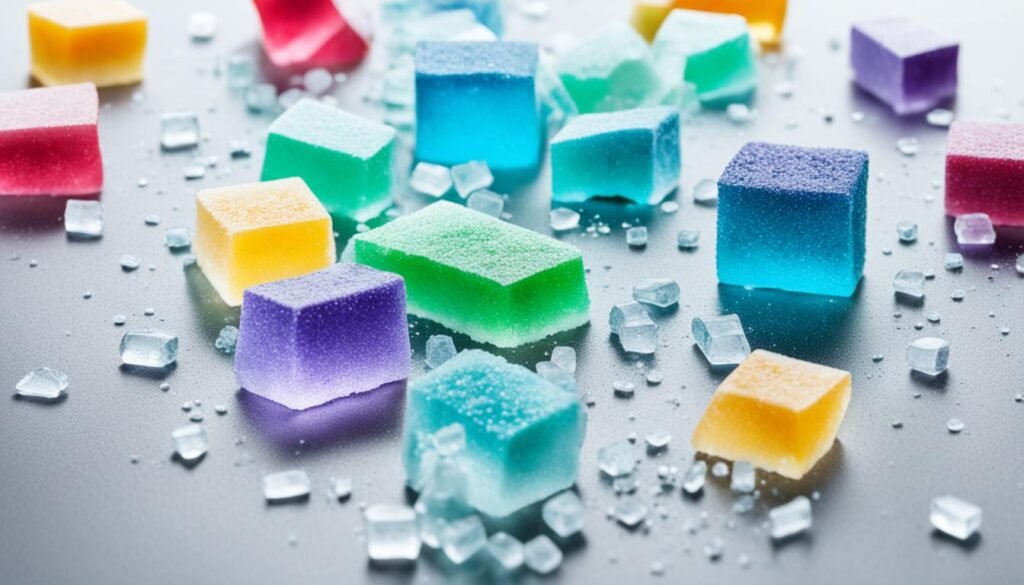Get our FREE E-Book HERE - 120 TIPS for Losing Weight & Bonus Tips for Postpartum Weight Loss & Dad’s Postpartum Experience
Artificial Sweeteners: What You Need to Know

Imagine enjoying your favorite sweets without the guilt of sugar. That’s what artificial sweeteners and sugar substitutes offer. They’re everywhere, from diet sodas to sugar-free gum1. But, knowing the good and bad about them is key before adding them to your diet.
We’ll explore artificial sweeteners in this article. We’ll look at their types, safety, and health effects. If you’re watching your weight, managing blood sugar, or just want to satisfy your sweet cravings, this guide has you covered12.
Key Takeaways:
- The FDA has approved several artificial sweeteners for use in the United States, including acesulfame potassium, advantame, aspartame, neotame, saccharin, sucralose, and purified stevia leaf extracts13.
- Artificial sweeteners can be 200 to 700 times sweeter than table sugar2.
- For healthy adults, artificial sweeteners are safe in moderation. But, using them a lot might raise health concerns1.
- Sugar alcohols, stevia, and monk fruit might cause bloating, gas, and diarrhea in some people12.
- Always check nutrition labels and control your intake of sugars and artificial sweeteners for good health2.
Understanding Artificial Sweeteners and Sugar Substitutes
Artificial sweeteners are made in labs and taste sweet but don’t have sugar’s calories. They include aspartame, saccharin, and sucralose, which are much sweeter than sugar45. Stevia, often seen as natural, is actually heavily processed and often mixed with other sweeteners4.
Types of Artificial Sweeteners
The FDA has approved many artificial sweeteners for foods and drinks. These include acesulfame potassium, aspartame, saccharin, sucralose, and neotame65. These sweeteners are much sweeter than sugar, so they let foods have fewer calories5.
Approved Sugar Substitutes and Their Safety
The FDA checks these sweeteners to make sure they’re safe to eat in small amounts for healthy adults6. They don’t raise blood sugar and don’t have carbs or calories6. But, some studies suggest they might lead to weight gain, and more research is needed5.
It’s best to eat mostly foods without added sweeteners, natural or artificial4. When picking products with sweeteners, check the labels for serving sizes, calories, and fat. They might have more calories or fat than sugar-sweetened foods6.
| Sweetener | Sweetness Level Compared to Sugar |
|---|---|
| Aspartame (Equal) | 200 times sweeter than sucrose5 |
| Sucralose (Splenda) | 600 times sweeter than sucrose5 |
| Saccharin (Sweet’N Low) | 200 to 700 times sweeter than sucrose5 |
| Acesulfame-K (Sunett, Sweet One) | 200 times sweeter than sugar5 |
| Neotame | 7,000 to 13,000 times sweeter than sugar5 |
| Monk Fruit Extract | 100 to 250 times sweeter than sucrose5 |
| Advantame | 20,000 times sweeter than sugar5 |
Benefits of Using artificial sweeteners

Artificial sweeteners are great for people who want to control their weight and blood sugar. They taste sweet but don’t have the calories of regular sugar. This makes them a good choice for cutting calories7.
Weight Management and Calorie Reduction
Switching to sweeteners can help you lose weight and reduce body fat. Studies show they can make you eat less and help you lose weight. This can lead to a lower body weight and waist size7.
Some studies even suggest that using these sweeteners can lead to a BMI drop of 1.3-1.7 points. Switching to sweetened drinks can also help you lose up to 2.9 pounds7.
Dental Health and Blood Sugar Control
Artificial sweeteners are good for your teeth and blood sugar too. They don’t cause cavities or raise blood sugar levels8. This is great for people with diabetes or prediabetes who need to watch their blood sugar9.
Research also shows that choosing sweetened drinks over sugary ones has health perks. People who drink diet soda have a 36% lower risk of metabolic syndrome. They also have less weight, belly fat, cholesterol, and blood pressure than soda drinkers7.
But, how people react to sweeteners can differ. The type of gut bacteria in each person affects how they process these sweeteners7. Some studies link sweetener use to health issues, but more research is needed to be sure8.
Using artificial sweeteners can be helpful for weight management, blood sugar control, and dental health. But, everyone is different. Always talk to a healthcare professional to find the best diet for you9.
Artificial Sweeteners and Weight Loss

The link between artificial sweeteners and losing weight is complex and debated. Many think they help with weight control and calorie cutting. But, research shows mixed results10.
Some studies point to slight weight loss with artificial sweeteners. Yet, others say they don’t help much with weight control11. This is because our bodies might not adjust well to sweet tastes without the calories. This can mess with how we control our hunger and might lead to eating more later10.
Many people who use artificial sweeteners still eat high-calorie foods. This can cancel out any weight loss benefits11. The World Health Organization (WHO) now says not to use non-sugar sweeteners for weight loss or to lower disease risk. They say there’s no long-term benefit in losing body fat10.
The effect of artificial sweeteners on weight control is complex. It can vary a lot from person to person. Factors like metabolism, food likes, and eating habits play a big role12. It’s best to see artificial sweeteners as part of a healthy diet, not just for losing weight.
Research on artificial sweeteners and weight loss is ongoing. People should talk to health experts to find the best way to manage their weight and health101112.
Health Concerns and Controversies

Artificial sweeteners are usually safe when used in small amounts. But, there are health worries and debates about their long-term effects13. Some studies say these sweeteners can harm the gut bacteria. This might affect how we control our appetite and could lead to weight gain and metabolic problems13. There are also debates about their long-term risks, like a higher chance of stroke, heart disease, and death. But, the proof on these points is not clear14.
Impact on Gut Bacteria and Appetite Regulation
New studies have shown concerns about how artificial sweeteners affect our gut microbiome13. This microbiome is key for controlling our appetite and health13. Some findings suggest that eating these sweeteners often can upset the balance of gut bacteria. This could change our appetite and metabolism, leading to weight gain over time13.
Potential Risks and Long-Term Effects
The long-term effects of eating artificial sweeteners are still being looked into, and the findings are mixed13. Some studies link these sweeteners to a higher risk of cancer, stroke, and heart disease. But, other studies haven’t found these links14. The IARC says aspartame might be possibly carcinogenic to humans, based on some evidence15. There are also worries about their effects on fertility, pregnancy, and brain development15.
We need more research to understand the long-term health effects of artificial sweeteners13. Until then, it’s wise to be careful and talk to health experts about using these sweeteners in our diets15.
Sugar Alcohols: An Alternative Option

Exploring sugar alcohols like erythritol, xylitol, and sorbitol is interesting. They are different from traditional sugar and can be a good choice for some people161718.
Sugar alcohols have fewer calories than regular sugar. Allulose is special because it has only 0.4 kcal/g, much less than regular sugar’s 4 kcal/g16. Sorbitol and mannitol also have fewer calories, making them a good option16.
They also might not raise blood sugar levels as much. Erythritol has a glycemic index of just 1, much lower than sugar’s 10018. This is good news for people with diabetes or prediabetes who want to control their blood sugar18.
But, sugar alcohols aren’t perfect. Eating a lot of them can cause stomach problems like bloating and diarrhea in some people18. It’s important to use them in moderation and see how your body reacts.
Sugar alcohols are a good choice for those looking for a sugar substitute. They have fewer calories and don’t raise blood sugar as much. But, they can cause stomach issues if eaten in large amounts. Knowing this can help you make better choices about using them in your diet.
Novel Sweeteners: Plant-Derived and Natural Options
A new type of sweeteners has come up, called “novel sweeteners” or “plant-derived noncaloric sweeteners”. These include stevia, monk fruit, allulose, and tagatose. They come from nature and are seen as better than artificial sweeteners19.
Stevia is a zero-calorie sweetener from the Stevia rebaudiana plant. The FDA says it’s safe19. Monk fruit extract and thaumatin are other natural sweeteners with unique tastes and lots of sweetness19.
These new sweeteners are often praised for their health benefits, like not affecting blood sugar. But, we need more studies on how they affect kids and teens19.
Honey and maple syrup are also natural sweeteners. They don’t raise blood sugar much and have antioxidants and antibacterial properties19. But, eating them should be in moderation as part of a balanced diet19.
Choosing between artificial and natural sweeteners depends on your health goals and diet. It’s important to be careful with both types to stay healthy19.
The food industry is changing, giving us more sweetener choices. Knowing the good and bad of these new sweeteners helps us make better choices for our health and taste192021.
Balancing Sugar and artificial sweeteners in Your Diet
Managing your sugar and artificial sweeteners is key for good health. You don’t need to cut out all sugar, but try to eat less added sugar. Instead, get natural sugars from foods like fruits and dairy2223.
Artificial sweeteners can be a good choice, but use them in moderation. These sweeteners are much sweeter than sugar, so you can use less in recipes23. But, studies show that switching to these sweeteners might not always be better for you, especially if you eat a lot of them9.
Be careful about how artificial sweeteners affect you. They can make you eat more, upset your stomach, and harm your health in the long run23. They might also cause bloating and stomach problems if you eat too much23.
To eat well, check food labels and choose whole foods that are naturally sweet. Foods like fruits, veggies, and whole grains are good choices23. If you have health issues, talk to a dietitian to make a diet plan that’s right for you23.
| Nutrient | Recommendation | Rationale |
|---|---|---|
| Added Sugars | No more than 6 teaspoons (25 grams) per day for women, 9 teaspoons (36 grams) per day for men | Too much sugar can lead to weight gain, type 2 diabetes, and heart disease23. |
| Artificial Sweeteners | Moderate consumption, as part of an overall healthy diet | Using too much can increase the risk of metabolic syndrome and type 2 diabetes23. |
| Natural Sweeteners | Opt for whole, minimally processed sources like fruits, dairy, and honey | Natural sweeteners are less likely to harm your health when eaten in moderation23. |
For a healthy diet, focus on moderation, being aware of what you eat, and choosing whole foods. Making smart choices about sugar and sweeteners can help you stay healthy22923.
Conclusion
Artificial sweeteners and sugar substitutes can help some people cut down on sugar. This can lead to better weight or blood sugar control24. But, it’s key to know the health concerns and debates about their long-term effects, especially in kids2526.
For healthy adults, artificial sweeteners are safe in small amounts2425. Still, it’s vital to eat a diet rich in whole foods. Pay attention to both natural and added sugars in your diet2425.
Making smart choices and using moderation can help you manage sweetness in a healthy way242526. Deciding to use artificial sweeteners should depend on your health goals and talks with your doctor. Aim for a balanced diet that supports your health.
While artificial sweeteners have benefits, use them with care. Focus on a healthy, lasting way of eating. By being informed and thoughtful, you can pick the right sweeteners for your health goals.
FAQ
What are artificial sweeteners and sugar substitutes?
What are the different types of artificial sweeteners approved for use in the United States?
Are artificial sweeteners safe for consumption?
How can artificial sweeteners benefit weight management and blood sugar control?
Are artificial sweeteners effective for weight loss?
What are the health concerns and controversies surrounding long-term artificial sweetener use?
What are sugar alcohols, and how do they differ from artificial sweeteners?
What are “novel sweeteners” or “plant-derived noncaloric sweeteners”?
How can I balance sugar and artificial sweeteners in my diet?
Source Links
- Pros and cons of artificial sweeteners – https://www.mayoclinic.org/healthy-lifestyle/nutrition-and-healthy-eating/in-depth/artificial-sweeteners/art-20046936
- Facts About Sugar and Sugar Substitutes – https://www.hopkinsmedicine.org/health/wellness-and-prevention/facts-about-sugar-and-sugar-substitutes
- Sugar Substitutes – familydoctor.org – https://familydoctor.org/sugar-substitutes/
- Artificial vs. natural sweeteners: The inside scoop on sugar substitutes – https://www.gundersenhealth.org/health-wellness/eat-move/artificial-vs-natural-sweeteners-the-inside-scoop-on-sugar-substitutes
- Sweeteners – sugar substitutes: MedlinePlus Medical Encyclopedia – https://medlineplus.gov/ency/article/007492.htm
- Artificial Sweeteners – Diabetes Education Online – https://dtc.ucsf.edu/living-with-diabetes/diet-and-nutrition/understanding-carbohydrates/demystifying-sugar/artificial-sweeteners/
- Artificial Sweeteners: Good or Bad? – https://www.healthline.com/nutrition/artificial-sweeteners-good-or-bad
- Are Sugar Substitutes Any Better For You Than Regular Sugar? – https://www.henryford.com/blog/2023/10/are-sugar-substitutes-any-better-for-you
- Artificial sweeteners: Any effect on blood sugar? – https://www.mayoclinic.org/diseases-conditions/diabetes/expert-answers/artificial-sweeteners/faq-20058038
- WHO advises not to use non-sugar sweeteners for weight control in newly released guideline – https://www.who.int/news/item/15-05-2023-who-advises-not-to-use-non-sugar-sweeteners-for-weight-control-in-newly-released-guideline
- Gain weight by “going diet?” Artificial sweeteners and the neurobiology of sugar cravings: Neuroscience 2010 – https://www.ncbi.nlm.nih.gov/pmc/articles/PMC2892765/
- Don’t use sugar substitutes for weight loss, World Health Organization advises | CNN – https://www.cnn.com/2023/05/15/health/who-sweeteners-weigh-loss-guideline-wellness/index.html
- Artificial Sweeteners and Cancer – https://www.cancer.gov/about-cancer/causes-prevention/risk/diet/artificial-sweeteners-fact-sheet
- Not so sweet: Study shows artificial sweeteners’ health harms – https://www.ewg.org/news-insights/news/2022/09/not-so-sweet-study-shows-artificial-sweeteners-health-harms
- Are Artificial Sweeteners Bad for You? – https://www.verywellhealth.com/artificial-sweeteners-5184450
- Sugars, Sugar Alcohols, & Artificial Sweeteners: What are the differences and how do each impact caloric content? – https://www.eurofinsus.com/food-testing/resources/sugars-sugar-alcohols-artificial-sweeteners/
- Sugar Alcohol – Yale New Haven Hospital – https://www.ynhh.org/services/nutrition/sugar-alcohol
- What Are Sugar Alcohols, and Are They a Healthy Sugar Swap? – https://www.healthline.com/nutrition/sugar-alcohols-good-or-bad
- Artificial Sweeteners vs. Natural Alternatives: Navigating the Sweetener Landscape – https://www.news-medical.net/health/Artificial-Sweeteners-vs-Natural-Alternatives-Navigating-the-Sweetener-Landscape.aspx
- Is there a ‘healthiest’ sugar substitute? What to know after WHO’s aspartame announcement. – https://www.usatoday.com/story/life/food-dining/2023/06/11/what-is-the-healthiest-sugar-substitute/70283021007/
- Natural Sweeteners: The Relevance of Food Naturalness for Consumers, Food Security Aspects, Sustainability and Health Impacts – https://www.ncbi.nlm.nih.gov/pmc/articles/PMC7504156/
- The Impact of Artificial Sweeteners on Body Weight Control and Glucose Homeostasis – https://www.ncbi.nlm.nih.gov/pmc/articles/PMC7817779/
- The Pros and Cons of Artificial Sweeteners | Banner Health – https://www.bannerhealth.com/healthcareblog/teach-me/are-artificial-sweeteners-really-worth-it
- Replacing Sugar with Artificial Sweeteners: Is the Replacement of Sugar with Artificial Sweeteners an Effective Strategy for Weight Loss? – Office of the Vice President for Research – https://sc.edu/about/offices_and_divisions/research/news_and_pubs/caravel/archive/2012/2012-caravel-artificial-sweeteners.php
- Artificial Sweeteners: The Good and the Bad – https://www.technologynetworks.com/applied-sciences/articles/artificial-sweeteners-the-good-and-the-bad-383329
- Artificial Sweeteners – an overview – https://www.sciencedirect.com/topics/agricultural-and-biological-sciences/artificial-sweeteners








